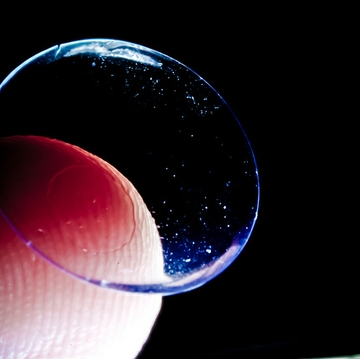
Don’t Sleep in Your Contacts!
UNM Emergency Medicine Doctors Comment on CDC Study
Millions of Americans wear contacts lenses on a regular basis. With proper care, they are considered safe for everyday use.
But what happens when you don't take proper care of wearing, storing or cleaning your contacts? What are the consequences if you sleep or swim with them on?
The results can range from nasty infections, to needing a cornea transplant - to losing your vision altogether.
Jon Femling, MD, PhD, and Justin Baca, MD, PhD, of The University of New Mexico Health Sciences Center's Department of Emergency Medicine, co-authored an article in the January edition of Annals of Emergency Medicine that looked at the risks of lens-related eye infections, especially among those who don't practice proper contact lens care.
Their article was a small commentary on a Centers for Disease Control and Prevention study that highlighted the risks of sleeping with contact lenses. They work with EMERGEncy ID NET - a sentinel network for research on emerging infectious diseases - which Femling said has for years been taking reports from the CDC and trying to adapt them to emergency medicine.
"I think the big thing for us, and this what the CDC found, is that one, there is kind of an under-reporting of people hurting themselves," Femling said. "And the second was that folks are doing regular things and are having devastating outcomes from what they are doing."
The CDC study looked at six people who slept in their contacts in different circumstances and ended up with terrible infections. In many of the cases, the infections led to their cornea (the eye's outermost layer) replaced or transplanted- or worse. And before that, the patients had to have drops in their eyes every hour for months to try to combat the infection.
"The big things that they found were when you sleep with your contacts at night, your eye local environment changes," Femling said. "You're not blinking, you're not protecting yourself the way you normally do. It puts you at risk of injuring that surface of your eye. If you do that for a couple of days, that puts up an area of weakness where the bacteria or the amoebas can get in and cause an infection."
Femling said he has seen the eye infections firsthand in the emergency department. He also had a friend several years back who wore contacts, got debris underneath them, then got an infection and fought it for months before having to have his cornea replaced.
Another big highlight, Femling said, is the acanthamoeba, the amoeba that infects the eye, is commonly found in water and probably in your tap.
"Rinsing it out underneath the sink - terrible idea," Femling said. "It probably hurts your eye just from putting it in. But the other part of it is that it probably gets those types of amoebas and things on there, which is just a terrible idea. Which is why clean contact lenses and all that stuff is absolutely paramount, so that we don't we have to replace your cornea."
Using sterile contact lens solution keeps the lenses clean, which is key.
"Use the contact lens solution, wash your hands," Femling said. "It's all the simple stuff, and you shouldn't have any problems. Millions of people wear contact lenses and are fine. I think that's really the key. Just keeping it clean and not sleeping in it."